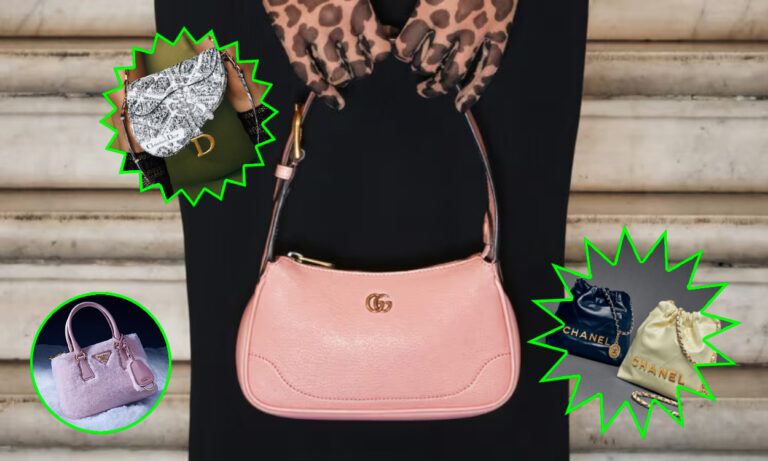From knockoff guilt to faking it till we make it, dupe culture is on the rise among gen Z

For gen Z, dupes (aka, an item that has qualities or similarities to a designer item but doesn’t overtly copy logos or trademarked features) are the perfect answer to emulating a popular trend at half the price.
The very nature of fashion is to recreate—after all, without trend cycles and recurring motifs, there would be no progression. There is, however, a fine line between finding a good dupe and participating in creative plagiarism.
Industry expert Business of Fashion recently found that over a third of gen Zers are willing to buy fakes, despite being well-known as the cohort set upon striving for political transparency and authenticity. But, with the counterfeit goods market being worth up to $4.5 trillion, have we officially taken the dupe challenge too far?
Dupe culture has always been fuelled by social media. Younger users of TikTok in particular have circulated dupes for everything from skincare to makeup to designer knockoffs. And as dupes and fake products go viral, people become more accepting of knockoffs as opposed to feelings of shame and embarrassment. If everyone’s doing it, what’s the big deal? Influencers are even encouraged to promote dupes with financial incentives. So, with every click comes an influx of cash.
The rise of dupes challenges exclusivity within the industry and counteracts the class ceiling. Fundamentally, not everyone can afford luxury high-end goods, but everyone should still be entitled to reap the benefits, whether that be enjoying the confidence that comes with joining in on the latest trend or tackling problematic skin.
Dupes allow for greater accessibility among a younger demographic that is not privileged to a disposable income. And with the current cost of living crisis, it’s always nice to feel like you’re grabbing a luxury bargain—despite issues regarding validity.
@maciestringer DOOOOOP #dupe #funny #fyp #trending #lolage #leicester
♬ original sound - mace💘💘
Gen Zers are subject to constant influence, whether it be through social media marketing campaigns, viral fashion aesthetics, celebrity inspo or even music trends. There’s no doubt that fashion and music operate symbiotically, and when an artist references a brand in their lyrics, sales and popularity skyrocket.
Beyoncé divided the fashion community when she sang: “This Telfar bag imported, Birkins, them shits in storage.” Meanwhile, 2 Chainz “walked out of Louis looking like a Virgil discount.” Flexing designer purchases signals status, particularly in the hip-hop and rap Genres.
However, there are also a number of musicians who’ve been seduced by the duping method. British-Nigerian grime artist, Skepta, recently shared his thoughts on the matter, declaring on Instagram that he’s been “flexing fake Gucci since 2017. It’s gotta be fresh out the market… the faker the better.”
View this post on Instagram
Despite his polarising view on fake luxury goods, Skepta’s remained a favourite in luxury fashion circles. Working with houses like Dior, Diesel and of course Louis Vuitton, the grime artist has been praised for his street style.
Stepping out from behind the decks, Skepta also paid an emotional tribute to his late friend and collaborator Virgil Abloh, who up until his passing in 2021 was the creative director at Louis Vuitton. With Skepta’s acceptance from the fashion industry, despite promoting Fucci, could Fior, Fada and fan favourite, Dolce and Banana be on the horizon for the musician?
Depop sellers are also jumping on the bandwagon, selling fake designer goods under the guise of “bootleg fashion.” The term bootleg implies a product that is made and sold illegally, but in contrast to straight-up fakes, there is a level of creative interpretation and aim to disrupt the hierarchy in luxury fashion. It’s definitely a facet of fashion that’s been highly divisive.
In the Depop sphere, bootleg predominantly includes monogrammed designer products that fit Y2K aesthetics. Even the Depop girlies aren’t ashamed of sporting a fake, if anything, they’re ready to embrace it wholeheartedly.
Do fakes affect the fashion industry?
With the help of trend forecasters, fast fashion brands can produce designer replicas before they’ve even stepped off the runway. What impact, however, is this having on the designers themselves? Dupes completely dismiss the creativity and hard work of the initial creator, allowing for fashion plagiarism to be normalised. For up-and-coming designers that rely on their products going viral, duping can be highly detrimental.
Marie Dewet, founder of French label MaisonCléo, has spoken out about the impact dupe culture has had on their business. Speaking with Rolling Stone, Dewet explained: “As a designer you put all your heart into your brand, so it really affects and hurts you. I was angry.” The designer also recalled catching a major fast fashion brand purchasing a product with the sole intent of analysing the build through deconstruction in order to produce an almost replica.
In comparison to fast fashion competitors, brands like MaisonCléo are advocates for sustainability and pride themselves on using deadstock fabrics. Startups have minimal legal protection making the companies financially vulnerable.
As dupes have increased in popularity, gen Zers have been criticised for their hypocrisy. As a sustainable cohort, we’ve been previously praised for our commitment to brand authenticity, ethical methods and transparency. Duping and fake goods have an undeniable link to fast fashion, a level of the fashion market that is synonymous with exploiting low-paid workers while also being incredibly harmful to the environment.
So, are gen Z desensitised to their values as and when it suits them? Or can we create a version of dupe culture that allows for evolution in fashion rather than producing identical clones?




